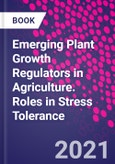Emerging Plant Growth Regulators in Agriculture: Roles in Stress Tolerance presents current PGR discoveries and advances for agricultural applications, providing a comprehensive reference for those seeking to apply these tools for improved plant health and crop yield. As demand for agricultural crops and improved nutritional requirement continue to escalate in response to increasing population, plant researchers have focused on identifying scientific approaches to minimize the negative impacts of climate change on agriculture crops. Among the various applied approaches, the application of plant growth regulators (PGRs) have gained significant attention for their ability to enhance stress tolerance mechanisms.
This book was developed to provide foundational and emerging information to advance the discovery of novel, cost-competitive, specific and effective PGRs for applications in agriculture.
Please Note: This is an On Demand product, delivery may take up to 11 working days after payment has been received.
Table of Contents
1. Emerging roles of plant growth regulators for plants adaptation
2. Role of salicylic acid-induced abiotic stress tolerance
3. Physiological, biochemical, and molecular mechanisms
4. Mechanism and function of salicylate in plant toward biotic
5. Jasmonates: role in stress tolerance
6. Physiological roles of karrikins in plants under abiotic stress conditions
7. Emerging roles of strigolactones in plant responses toward biotic stress
8. Nitric oxide and hydrogen sulfide interaction in plants under adverse environmental conditions
9. Melatonin: an elicitor of plant tolerance under prevailing environmental stresses
10. Strigolactones: regulation of biosynthesis, hormonal crosstalk, and its role in abiotic stress adaptation
11. Physiological roles and signaling of polyamines in plants under stressed conditions
12. Physiological roles of hydrogen sulfide under heavy metal stress
13. Role of glycine betaine in stress management in plants
14. Biogenic amines in plant cell at norma and stress: probes for dopamine and histamine
15. Alleviation of abiotic stress by newly discovered fire-instigated hormone: Karrikin
16. Role of sugars in crop stress tolerance under challenging environment
17. Acquisition of physiological modulations in medicinal plants through degraded natural polysaccharides under dynamic environment
18. Roles of turgorins and systemins in promoting agriculture
19. Effects of triazoles, strobilurins, and trinexapac ethyl on growth and development of crop plants under stress conditions
20. Use of biostimulants in tolerance of drought stress in agricultural crops








